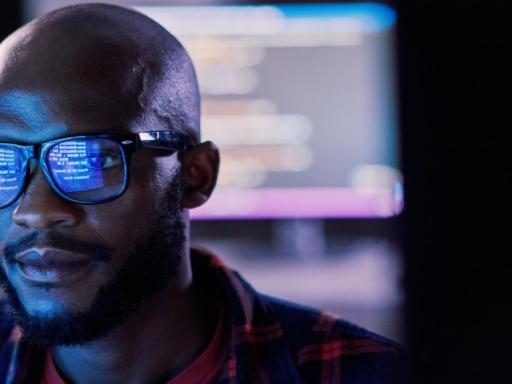Take CRIM-120.
Investigate Digital Crime with High-Demand Skills
Enter the growing field of digital investigations with Champlain College Online's (CCO) Associate of Science in Digital Forensics. This 60-credit program equips you with the practical skills to collect, analyze, and document digital evidence using industry-standard tools and techniques. Through a curriculum that balances technical knowledge with legal understanding, you'll learn to investigate cybercrime, recover deleted data, analyze network intrusions, and follow proper evidence handling procedures—preparing you for entry-level roles or an immediate transfer into our Bachelor's in Computer Forensics and Digital Investigations.
Finish your program faster with credit for prior learning and experience.
Differentiate your degree and get your resume noticed with a certificate. Speak with your advisor for information.
Develop Essential Digital Investigation Skills
- Digital Evidence Collection and Analysis: Learn proper techniques for preserving, documenting, and examining digital evidence from computers, mobile devices, and networks.
- Forensic Tool Proficiency: Gain hands-on experience with current digital forensic software and hardware used by professionals in the field.
- Operating System and Network Forensics: Understand how to extract and analyze evidence from various operating systems and network environments, including techniques to counter anti-forensic measures.
- Legal Framework Knowledge: Examine criminal law and procedure as they apply to digital investigations, ensuring your work meets legal standards for evidence admissibility.
- Cybersecurity Fundamentals: Build a foundation in network security, vulnerability assessment, and incident response to understand cybersecurity's defensive and investigative aspects.
- Programming Basics: Develop introductory Python scripting skills that enable you to automate and customize digital forensic processes.
Program Curriculum
Champlain's online courses encompass the top skills needed by today's professionals. Graduates of the program are required to complete the following courses.
Professional Courses (30 credits)
General Education Courses (21 credits)
General Electives (9 Credits)
This course introduces students to the fundamentals of substantive criminal law. With this foundation for understanding the legal system students will identify the essential elements of crimes, including the criminal act, criminal state of mind, and jurisdiction. They will examine the rationale underlying criminal law, factors affecting criminal responsibility, and legal defenses. By analyzing real-world scenarios, students will develop skills to distinguish lawful from unlawful actions and prepare for advanced studies or careers in criminal justice.
This course focuses on the rules and procedures governing how the American criminal justice system must process individuals suspected, accused, and convicted of law violations.
In this course, students will explore the theory and fundamentals of criminal investigation, emphasizing practical applications for evidence handling and case development. Students will review basic responsibilities of investigators and protocols for report writing, evidence collection, and preparation of cases for trial. The curriculum examines investigative approaches for various crime categories, including violent offenses, property crimes, terrorism, and hate crimes, while introducing comparative perspectives from diverse legal systems.
Prerequisites
This course provides students with an understanding of the many different devices and technologies, from historical to emerging, that are required to design and build networks. In a broad survey of concepts and terminology, students will learn about topology, communications, protocols, and security, and to diagram basic networks to specification.
From day one, students in this course are problem solving, first in terms of algorithmic design and then as early as week two via programming in the latest version of Python, using PyCharm. Students begin by writing a program to have a conversation, having strings and numbers as input, and advance, by week seven, to building a working password saver program, capable of looking up, adding (and encrypting), and storing passwords.
This course, through guided research and hands-on learning experiences, provides students with an understanding of operating systems, including their core fundamental principles and how they work. Students are introduced to the three most popular operating systems for personal computers (Windows, OSX and Linux), and mobile operating systems, and learn about standard functions such as memory, process/thread, input/output, storage and device management.
This exciting course introduces students to the myriad software tools and best practices for handling digital evidence. Labs utilize Champlain College Online's Forensic VDI and challenge students to begin building their skills, from creating a hash value for a forensic copy with X-Ways Forensics and FTK Imager, to examining evidence with The Sleuth Kit (TSK), Autopsy and/or EnCase.
Prerequisites
Complete CMIT-135 and CMIT-140
Dig into network forensics and anti-forensics in this course, where students examine files for hidden messages and learn to use programs like MobileFish, OpenPuff and SilentEye to hide files in images and audio files, and Wireshark and NetworkMiner to analyze packet captures. Students also work with the Windows registry, practice locating Internet passwords from browsers using IE PassView and Google tools, and encrypt files/folders using AESCrypt and similar open source programs.
Prerequisites
CFDI-240 and CMIT-130
Building on the skills students have previously acquired, this course offers students the opportunity to deep dive into a case using X-Ways Forensics to examine the registry, understand "typical" user activities on the Internet (social media and search histories, for example), and create a timeline/events. Students also gain more experience with RegRipper along with an introduction to analyzing a memory dump using Volatility.
Prerequisites
Complete CFDI-240
This course will introduce foundation subject matter and technologies that are critical to the multidisciplinary landscape of cybersecurity.
This course introduces students to the foundational concepts needed to communicate effectively in writing for academic study and professional development. Students will also learn to read critically to evaluate an author's message. Students will be introduced to rhetorical modes and their role in the development of written communication. Students will also learn how to use revision strategies to create written communication that meets its intended purpose for its intended audience
This course builds on students' proficiency in the writing process and rhetorical modes to introduce the use of sources in written communication. Students will practice information literacy as they learn to determine information needs from sources, develop effective search strategies, and incorporate sources in written communication, legally and ethically.
Prerequisites
Complete ENGL-100
Starting with a frame of human communication as a dynamic system of interactions in which people make choices that impact their relationships, other people, and themselves, students will define theory-informed communication concepts and processes, and critically examine how they apply to everyday life across a variety of contexts. Students will reflect on how the theory, concepts and processes apply to their own lives in becoming competent communicators who are knowledgeable, skilled, and versatile.
Students will learn and apply critical inquiry skills to analyze persuasive communication created by others and to develop persuasive communication/arguments of their own to solve problems in professional, civic, social, and personal contexts. Specifically, students will learn to recognize fallacies in logic; apply inductive and deductive reasoning strategies to the interpretation and development of persuasive communication; evaluate the validity of sources; and develop logically sound persuasive communication. Students will explore the roles of self-awareness, empathy, and ethics in the context of critical inquiry and the development of arguments.
Prerequisites
Complete ENGL-110.
Ethics refers to accepted standards of right and wrong that prescribe what humans ought to do in various contexts, typically in relation to rights, obligations/duties, benefits to society, fairness, consequences, and virtues. In this course, students will explore both theoretical and practical dimensions of ethics in order to 1) define ethics and identify ethical positions and principles, 2) critically reflect on how ethics impacts individual and collective responsibility, decision-making, and action, and 3) apply ethics to the personal, civic, and professional contexts.
Prerequisites
ENGL-110
Mathematical reasoning, when applied to everyday and professional lives, has two dimensions: logic for deterministic situations and probabilities for non-deterministic situations. This course aims to help students develop these mathematical reasoning skills.
This course introduces students to basic statistics for data literacy. With a focus on exploring real-world data, students will interpret numerical information and utilize the tools necessary to complete the entire statistical process: designing a study; gathering, organizing, and analyzing sample data; and making inferences about a population. Students will demonstrate data-driven decision-making and effective communication of numerical data.
Introduces students to the biochemistry and physiology of nutrition and exercise. Emphasis will be placed on human body systems such as musculoskeletal, digestive, respiratory and circulatory, and their relationship to nutrition and fitness. Students will also study the biochemistry of energy conversion as it relates to exercise physiology. Laboratory sessions are designed to reinforce, by a hands-on approach, the principles discussed in lecture. Course includes two laboratory hours per week.
Students will develop the ability to apply scientific methods to understand the natural world, to identify scientific aspects of daily life, and to evaluate the quality of scientific information based on its source and the methods used for its generation.
With pressure and release, a window opens and closes, recording light on a sensor. The simple action captures the instinct, judgement, and skill of the person behind the lens. This class will begin a study of the art and craft of photography. Students will develop their vision and their understanding of how to achieve it. Solid skills will be learned and many doors will be opened.
A survey of the continuing change experienced in art since the 15th century. Students will examine how an image is achieved as well as the significance of the subject represented. Individual inquiry concerning the nature of art is encouraged.
Students learn to appreciate films through the critical analysis of various elements of mise-en-scene, cinematography, editing and sound. The course introduces the conventions of classical Hollywood cinema, considers the work of one major director (auteur), and surveys selected international and independent films. Students view and discuss films each week.
Students in the course will explore the cultural history of the music genre broadly referred to as rock. Students will explore the social, economic and political contexts that are influenced by and that influenced each style in the United States. By listening, watching, reflecting upon, discussing and writing, students will explore how music takes on meaning, personally, and culturally. Topics and themes include the relationships between and among gospel, country, funk, folk, disco, rap and hip hop; the role of business and technology in those relationships, and political or transgressive elements of rock music.
In this course, students will investigate how communication practices and processes shape organizations across settings such as businesses, nonprofit, and civic organizations. By examining case studies, applying theory to practice, and reflecting on their own experiences and observations, students critically analyze how communication impacts collaboration, conflict management, and organizational change. Students will explore the role of digital and mediated communication and how organizations communicate externally with stakeholders, partners, and the broader environment.
Principles of Economics introduces the fundamental concepts of economics - the study of how people manage resources, and how they react to scarcity. This course focuses on both microeconomics (the behavior of consumers and companies) and macroeconomics (large-scale economic factors such as employment and interest rates), so that you'll gain a broad understanding of how a modern market economy functions, how decisions in business settings are informed by economics, and how economics applies to your everyday life.
Students will study important themes in the social history of the United States since the Civil War. This course allows students to expand their critical thinking skills through an examination of primary and secondary sources. Themes might include: the evolving status of women; the immigrant experience; the concept of the American dream; the paradox of freedom vs. slavery; the minority experience; the tensions between social classes. Students will be evaluated primarily on writing assignments.
Students will learn how to create conditions for successful conflict engagement, a necessary skill for any professional. The course focuses on the foundational capacities to remain calm and connected with oneself and others. In this state students can access helpful ideas and responses and be their best selves regardless of environment. Improving facility for conflict creates stronger relationships and reduces fear. By the end of the course, students will understand that disagreement and difference can become a source of personal and interpersonal growth.
Ethics refers to accepted standards of right and wrong that prescribe what humans ought to do in various contexts, typically in relation to rights, obligations/duties, benefits to society, fairness, consequences, and virtues. In this course, students will explore both theoretical and practical dimensions of ethics in order to 1) define ethics and identify ethical positions and principles, 2) critically reflect on how ethics impacts individual and collective responsibility, decision-making, and action, and 3) apply ethics to the personal, civic, and professional contexts.
Prerequisites
ENGL-110
In this course, students will explore broad, foundational knowledge in psychology, including its history, major theorists and a survey of psychology subfields such as developmental, cognitive and social psychology. Students will also describe and assess the role of ethics and social responsibility in the study and application of psychological theory and practices.
In this class, students will explore how social relationships, groups, societies and culture develop and change over time. From a sociological theory foundation and employing the sociological imagination, students will examine the impact of social structures, institutions, and systems on individual lives. Students will apply sociological research methods to investigate sociological phenomena in their own lives.
This course explores the complex and evolving relationship between human beings and technology. Through a multi-disciplinary approach that draws on fields such as sociology, psychology, philosophy, and history, students will examine the ways in which technology has shaped human culture, identity, and values, as well as how humans have influenced and continue to influence the development, adoption and use of technology.
Starting Fall 2026, instead of the category "Inquiry & Analysis" with a choice of CRIT 220 or PHIL 340 students will have a category of "Integration" with CRIT 100 Mindsets for Modern Learning.
Additional Program Details
- Explain fundamental concepts in computer networking, scripting, operating systems, and cybersecurity principles as they apply to digital forensics.
- Apply digital forensic investigation techniques to collect, categorize, and analyze data from digital sources using appropriate tools.
- Identify and interpret laws, regulations, and ethical standards related to the acquisition, handling, and professional use of digital evidence.
- Describe the principles of criminal law and procedure, and their relevance to digital forensic investigations.
- Explain and evaluate strategies for countering anti-forensics techniques in digital investigations.
Design your own degree and enhance its value and focus by adding a certificate. Adding a certificate allows you to develop specialized skills, strengthen your résumé, and tailor your education to align with career goals. Choose from the undergraduate certificates on this page.
Note: To earn a certificate, you must speak with your advisor first. You must be officially enrolled in the certificate program before you complete the required courses in it — coursework completed prior to enrollment cannot be applied later, and certificates may not be added retroactively. Careful planning with an advisor is essential to ensure all policies and timelines are met.
Our admissions team seeks to admit students who:
- Demonstrate a solid academic foundation - a minimum 2.5 GPA is our recommendation, though exceptions may be made on a case-by-case basis for those who demonstrate a potential for academic success in other ways.
- Possess an aptitude for success in an online learning environment.
- Exhibit the ability to make a positive contribution to the Champlain College Online community.
To learn more about submitting transcripts, or requirements for home-schooled students, those educated abroad or returning students visit our Undergraduate Admissions page.
Our transfer credit evaluation team works hard to ensure you get the transfer credits you deserve, from a variety of sources including prior college credits, work experience and training, military training and experience, and more. Our goal is to help you graduate from Champlain College Online as quickly and affordably as possible. Visit our Transfer Credit Options page to learn more.
Champlain College Online's software development faculty, led by Department Chair Richard Pickering, are expert practitioners in the field. Their industry expertise ensures that our software development curriculum is aligned with the needs of employers, and reflects the skills today’s software development professionals need for success. Classes led by our seasoned experts will give you real-world insight into the field, and create a rich community of career-focused learning.
Tuition & Costs
Online Undergraduate Tuition Fall '25 - Summer '26
Tuition & Costs
Online Undergraduate Tuition Fall '26 - Summer '27
* Alumni is defined, for this tuition rate, as any degree program graduate from Champlain College or Champlain College Online.
** Veteran rate effective Spring 2025, not retroactive
See the undergraduate cost of attendance and fees here
Affordability and Paying For Your Education
We provide a number of options to make your online education affordable, including preferred tuition for alumni, associate degree graduates, community college graduates, and military.
What Can You Do With a Digital Forensics Associate Degree?
According to the Bureau of Labor Statistics, computer and information technology occupations are projected to grow much faster than the average for all occupations from 2023 to 2033, with around 356,700 job openings yearly*. This growth is driven by the increasing frequency of cyberattacks and the need for skilled professionals to investigate digital crimes.
*Source: Bureau of Labor Statistics (BLS), Computer and Information Technology Occupations
Entry-Level Positions for AS in Digital Forensics Graduates:
- Digital Forensics Technician
- Cybersecurity Analytics Assistant
- Technical Support Assistant
- Computer Crime Analyst
- Incident Response Analyst

Why Champlain
Career Growth
"I had a two-year degree and knew I would need a bachelor's to advance. I saw that the U.S. Department of Labor projected a high demand for employees in accounting, and Champlain is ranked one of the top schools for accounting, so it was the right fit."

Academic Excellence and Recognition

Regionally accredited by the New England Commission of Higher Education

Designated as a Military Friendly School for our commitment to the military community
Ranked among the best by Tech Guide for game design and computer science

Named the among the best schools with accelerated bachelor's degrees by Intelligent.com
Meet the Program Director
Richard Pickering, PhD
- Computer Science
- Software Development
- Software Engineering & Project Management
- Web Design & Development
About
Dr. Richard Pickering is an Assistant Professor and the Program Director for Technology here at Champlain College Online. Richard has a Ph.D. in Teaching and Learning coupled with an MBA and numerous technology-related certifications.
Prior to Champlain, Dr. Pickering enjoyed a distinguished career blending pedagogical expertise with strategic leadership in program management and product development in the educational business sector.
Dr. Pickering also has held positions as Chief Executive Officer at Virtual High School Global Consortium, Chief Operating Officer at Victory Productions, various Program/Product Manager posts as well as Adjunct Professor appointments.

FAQs: Digital Forensics Associate Degree
Yes, our associate’s in digital forensics is a perfect fit for any tech-driven individual who wants to work in law enforcement. If you love working with computers and want to channel your passion into an exciting career, this could be the perfect first step. With your associate’s degree, you can start working in entry-level roles.
Digital forensics tools help investigators analyze technology for evidence of criminal behavior. This associate program can help you learn how to critique data, predict outcomes, and implement solutions backed by data.
This AS in digital dorensics lays the foundation for several of our bachelor’s programs. Our Computer Forensics & Digital Investigations degree program is a perfect fit for students who complete this program. However, you can also consider other tech-related areas, such as cybersecurity, computer science, data science and artificial antelligence, and more.
You May Also Be Interested In
Get More Information about the associate degree in Digital Forensics
Learn what you can expect from our online associate degree in digital forensics program.

Download Program Guide
I acknowledge that, by clicking the "submit" button, I am giving my express written consent to Champlain College and its representatives to contact me about educational opportunities via email, text, or phone, at the phone number above, including my mobile phone, using an automatic dialer, or pre-recorded message. Message and data rates may apply. I understand that my consent is not a requirement for enrollment, and I may withdraw my consent at any time.



